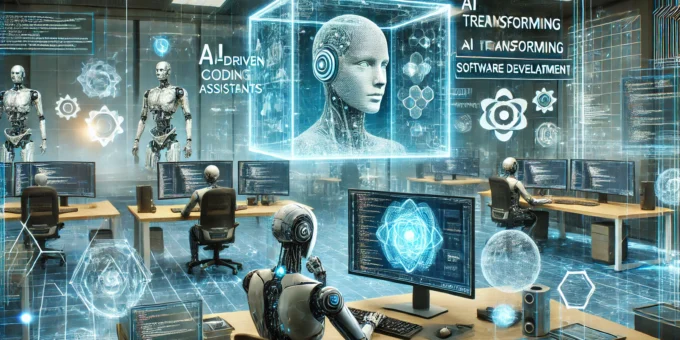
Introduction
Artificial Intelligence (AI) is revolutionizing every industry, and software development is no exception. From automating repetitive tasks to enhancing security and improving user experiences, AI is changing the way software is built, tested, and maintained.
But what does this mean for developers? Will AI replace human programmers, or will it become an essential tool that enhances their work? In this article, we explore how AI is transforming software development and what the future holds for this exciting field.
AI-Powered Automation in Software Development
One of AI’s biggest contributions to software development is automation. AI-driven tools help developers write, test, and debug code more efficiently.
Automated Code Generation
AI-powered tools like GitHub Copilot and OpenAI Codex can suggest entire blocks of code, reducing development time and minimizing errors.
AI in Testing and Debugging
AI automates software testing, catching bugs faster than traditional methods. Tools like Testim and Applitools use AI to detect issues in real time.
Smart Code Reviews
AI-powered code review tools analyze code quality, identify vulnerabilities, and suggest improvements, making code reviews faster and more reliable.
The Rise of Low-Code and No-Code Platforms
AI is democratizing software development by enabling low-code and no-code platforms. These tools allow users with minimal coding experience to build applications using drag-and-drop interfaces.
AI’s Role in Simplifying Software Development
Platforms like OutSystems and Mendix use AI to recommend code snippets, optimize workflows, and detect potential issues before deployment.
Benefits for Non-Technical Users
Entrepreneurs and business users can now develop applications without needing a programming background, accelerating digital transformation across industries.
AI in Software Testing and Quality Assurance
AI is revolutionizing software testing and QA, ensuring better software reliability.
AI-Based Bug Detection
AI-driven tools analyze patterns in past coding errors to predict and prevent new bugs.
Predictive Testing Models
Machine learning models can simulate user interactions, detecting potential software failures before they occur in real-world usage.
AI and Machine Learning in Software Security
Security threats are evolving, and AI is becoming a powerful ally in cybersecurity.
Identifying Security Vulnerabilities
AI scans code for vulnerabilities, preventing potential security breaches before they become critical issues.
AI-Powered Threat Detection
AI-driven security tools monitor software for suspicious activity, protecting applications from cyberattacks in real time.
AI-Driven Software Maintenance and Updates
Maintaining software is time-consuming, but AI is making it more efficient.
Predictive Maintenance
AI predicts when a software component might fail, allowing developers to fix issues before they become critical.
Self-Healing Software
Some AI-powered systems can automatically identify and fix software bugs without human intervention.
AI in Software Design and User Experience (UX)
AI is also enhancing software design and user experience (UX) by making applications more intuitive and user-friendly.
AI-Driven UI/UX Enhancements
AI analyzes user behavior to optimize UI/UX design, making software more engaging.
Personalized User Experiences
AI-driven recommendation engines, like those used by Netflix and Amazon, enhance software personalization.
The Role of AI in DevOps and Continuous Integration/Deployment
AI is improving DevOps and CI/CD (Continuous Integration and Continuous Deployment) by optimizing workflows and speeding up software releases.
AI for Faster and Smarter Deployments
AI can predict deployment failures and recommend fixes before pushing updates to production.
AI-Driven Infrastructure Management
AI tools manage cloud resources efficiently, ensuring optimal performance and cost savings.
AI and Cloud Computing in Software Development
Cloud computing and AI are a powerful combination that enhances scalability and efficiency.
AI-Optimized Cloud Resource Management
AI dynamically adjusts cloud resources based on demand, preventing unnecessary costs.
Serverless Computing and AI
AI-powered serverless platforms enable developers to focus on writing code without worrying about infrastructure management.
The Challenges and Limitations of AI in Software Development
Despite its benefits, AI in software development comes with challenges.
Ethical Concerns and Bias in AI
AI can inherit biases from training data, leading to unintended discrimination in software applications.
Dependency on AI and Job Displacement
Will AI replace developers? While AI automates tasks, human creativity and problem-solving remain irreplaceable.
The Future of AI in Software Development
So, what’s next for AI in software development?
AI and Human Collaboration in Coding
AI will continue to assist developers rather than replace them, improving efficiency and innovation.
What’s Next for AI-Powered Software Engineering?
Expect to see more AI-driven coding assistants, advanced automation, and intelligent debugging tools in the coming years.
AI is transforming software development in unprecedented ways. From automating coding tasks to improving security and user experience, AI is making software development faster, smarter, and more efficient.
While AI will continue to evolve, human creativity and expertise will remain essential in building the future of technology. The key is to embrace AI as a tool that enhances, rather than replaces, human capabilities.